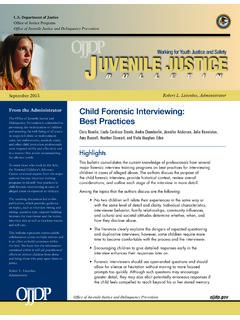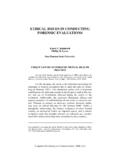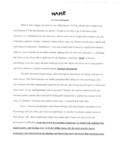Transcription of The Forensic Experiential Trauma Interview (FETI)
1 The Forensic Experiential Trauma Interview (FETI). By Russell W. Strand United States Army Military Police School Traumatized individuals often undergo a process many professionals and victims do not commonly understand. Many professionals inside and outside law enforcement have been trained to believe when an individual experiences an event, to include a Trauma event, the cognitive (prefrontal cortex) brain usually records the vast majority of the event including the who, what, where, why, when, and how, and peripheral vs. central information. This approach often ignores the role of bottom-up attention of the more primitive portion of the brain during a highly stressful or traumatic event. Therefore, when the criminal justice system responds to the report of a crime most professionals are trained to obtain this type of When Trauma occurs, the peripheral and higher-level thinking and processing of When prefrontal cortex Trauma occurs, thewill prefrontal information.
2 This may lead to discounting the enhancement frequently cortex shut down will frequently shut down of memory traces for what was attended, via bottom-up mechanisms and norepinephine and glucocorticoid effects leaving the less advanced leaving the less advanced portions on the amygdala and hippocampus. Sadly, collecting portions of the brainoftothe brain toand experience information about the event in this manner while experience and record the record the event. overlooking the manner in which Trauma shapes the memory event. may actually inhibit traumatic or highly stressful or fear- producing memory recall and the accuracy of the details provided. Trauma victims/witnesses do not generally experience Trauma in the in the same way most of us experience a non-traumatic event. The body and brain react to and record Trauma in a different way then we have traditionally been led to believe.
3 When Trauma occurs, the prefrontal cortex will frequently shut down leaving the less advanced portions of the brain to experience and record the event. The more primitive areas of the brain do a great job recording Experiential and sensory information, but do not do very well recording the information many professionals have been trained to obtain. Most Interview techniques have been developed to Interview the more advance portion of the brain (prefrontal cortex) and obtain specific detail/peripheral information such as the color of shirt, description of the suspect, time frame, and other important information. Some victims are in fact capable of providing this information in a limited fashion. Most Trauma victims however are not only unable to accurately provide this type of information, but when asked to do so often inadvertenly provide inaccurate information and details which frequently causes the fact-finder to become suspicious of the information provided.
4 Stress and Trauma routinely interrupt the memory process thereby changing the memory in ways most people do not accurately appreciate. One of the mantras within the criminal justice system is inconsistent 1. statements equal a lie . Nothing could be further from the truth when stress and Trauma impact memory, research shows. In fact, good solid neurobiological science routinely demonstrates that, when a person is stressed or traumatized, inconsistent statements are not only the norm, but sometimes strong evidence that the memory was encoded in the context of severe stress and Trauma . In addition, what many in the criminal justice field have been educated to believe people do when they lie ( , changes in body language, affect, ah-filled pauses, lack of eye contact, etc.) actually occur naturally when human beings are highly stressed or traumatized.
5 Science of memory and psychological Trauma must be applied to Interview approaches and techniques. Since the vast majority of traditional training and experience has caused many to focus on the higher functioning portons of the brain and research clearly shows these portions of the brain are not generally involved in experiencing, reacting to, or recording the experience, the FETI process was developed and implemented as proven methods to properly Interview the more primitive portions of the brain. This technique not only reduces the innacuarcy of the information provided, but will greatly enhance understanding of the the experience, thereby increasing the likelyhood of a better understanding of the totality of the event. FETI is a highly effective technique for victim, witness, and some suspect/subject interviews.
6 FETI entails the adaptation of the principles used in critical incident stress debriefing and defusing (impact of the event including emotional and physical responses) as well as principles and techniques developed for Forensic child interviews (open-ended, non-leading questions, soft Interview room, and empathy) as well as neurobiology of memory and psychological Trauma (initially tapping into the lower-functioning portion of the brain to understand the experience as well as the meaning of the experience in a non-threatening, non-suggestive manner). This concept and approach of this technique can be described as a Forensic psychophysiological investigation an opportunity for the victim to describe the experience of the sexual assault or other traumatic and/or fear-producing event, physically and emotionally.
7 This method has resulted in reports of better victim interviews by those who have used it. More importantly, the FETI Interview process obtains significantly more information about the experience, enhances a Trauma victim's ability to recall, reduces the potential for false information, and allows the interviewee to recount the experience in the manner in which the Trauma was experienced. The FETI Interview enhances the investigative process by taking a one-dimensional traditional investigation and turning it into a three-dimensional, offense-centric investigation, including subjective experiences indicative of Trauma -based brain states. Traumatic memories are often encoded and retrieved differently than non-traumatic memories, so they have that dimension of the experience, and then presenting the fullness and limitations of the victim's memories, including the fragmented sensations and emotions, lack of narrative and sequencing, etc.
8 , which are then critical facts of their own. This technique significantly enhances the quality and quantity of testimonial and psychophysiological evidence obtained. This method has also been shown to drastically reduce victim recantations, increase victim cooperation and participation and significantly improves chances for successful investigations and prosecutions. 2. The Forensic Experiential Trauma Interview includes using Interview techniques described below: One of the greatest needs of anyone who has experienced or is experiencing high stress and/or Trauma is the need to be safe; trust is central to that need. a. Acknowledge the victim's Trauma and/or pain. This will assist you, the listener, to demonstrate genuine concern and empathy towards the interviewee in an attempt to provide a sense of psychological and physical safety during the Interview process.
9 It may be difficult to establish trust with someone whose trust may have been horribly violated by another human being they may have trusted. Every effort should be made by you to demonstrate genuine empathy, patience, and understanding towards the person with whom you are facilitating a disclosure of their experience. You may need to spend additional time establishing sincere empathy and caring concern to be invited into their traumatic and/or painful experience, which we call the Trauma bubble. One of the greatest needs of anyone who has experienced or is experiencing high stress and/or Trauma is the need to be safe; trust is central to that need. The interviewer must take responsibility to build trust in the most effective and appropriate way. Once trust is established, the interviewer may be invited into what can be termed as the Trauma bubble.
10 The Trauma bubble is where much of the most important psychophysiological evidence may reside. It is vitally important for the interviewer to demonstrate patience, understanding, and empathy in a non-judgmental manner throughout the Interview process. b. Ask the victim/witness what they are able to remember about their experience. Two key words in this question are able and experience . Not all victims are able to recall all significant information about something that happened to them initially or even after a period of time. Using the word able has been proven to relieve some pressures on the Trauma victim thereby increasing the information they are able to provide. Using the term experience encourages the victim to describe their actual experience relieving the pressure on the interviewee to try to figure out what is important to the interviewee in the context of a criminal investigation.





